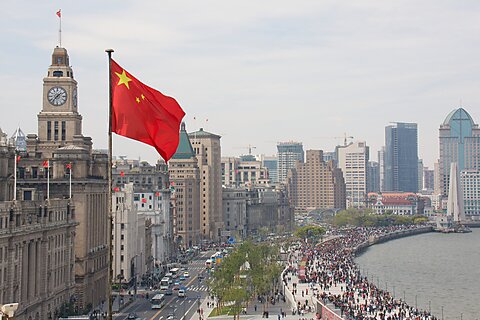
In an effort to improve China’s growth prospects, the People’s Bank of China (PBOC) is cutting banks’ reserve requirements to free up funds for lending. PBOC Governor Pan Gongsheng, who takes his marching orders from the State Council, plans to lower reserve requirements against bank deposits beginning February 5, which would free up nearly 1 trillion yuan (about $139 billion) for new lending aimed at shoring up housing and stock markets. Trying to prop up housing and stock prices, however, cannot solve China’s fundamental problem: too much government and too little freedom.
The Source of China’s Troubles
Since Xi Jinping took over in 2012, China has backtracked on market‐oriented reforms and further suppressed individual freedom. In November 2013, the Central Committee of the Chinese Communist Party (CCP) adopted a roadmap for deepening reform at its Third Plenum. One of the key provisions of that roadmap was to make the market a “decisive” factor in allocating resources. But that promise was never fulfilled as Xi consolidated his power and reverted to industrial policy and state‐led development.
Although the Central Committee paid lip service to the market, it had no firm commitment to establish a true free market, because its monopoly on power would be threatened. Thus, its “Decision … on Some Major Issues Concerning Comprehensively Deepening the Reform,” immediately makes it clear that, “To deepen the reform comprehensively, we must hold high the great banner of socialism with Chinese characteristics.”
Xi Jinping, as the paramount ruler, does not want what Milton Friedman (1990: 125) called “free private markets,” bounded by a genuine rule of law that protects persons and property. He does not trust social and economic order to emerge from a decentralized, market system based on private property and freedom of choice. What he wants is a vaguely defined “socialist market economy”—with a “socialist rule of law”— in which individuals are subservient to the state. Yet, as Wu Jinglian, one of China’s leading reformers, has argued, “Only by matching the rule of law with the market economy can we achieve total success.”
Xi Jinping’s pivot from marketization to industrial policy assumes state‐financed infrastructure spending is the path to long‐run growth. Yet, as Zhang Jun, dean of Fudan University’s School of Economics, warns:
The crux of the problem is not whether to further stimulate infrastructure investment by releasing more liquidity, but rather about concentrating on enhancing China’s potential growth rate trend. Significant improvements are needed in this area. Looking ahead, if China’s policies do not prioritize addressing systemic issues and increasingly rely on marketization to rectify inefficiencies in capital distribution, the persistent problems of investment waste and misallocation will continue to trouble its economy. Without these reforms, stabilizing the potential growth rate will remain challenging.
In sum, embracing state‐financed industrial policies, which focus on fixed‐asset investment at the expense of private‐sector growth, jeopardizes long‐run productivity as well as freedom for the Chinese people (see Sternberg 2024). The latter is especially harmed by Xi’s crackdown on a free market in ideas.
China Needs a Free Market for Ideas
In 2012, Ronald Coase and Ning Wang introduced the term “market for ideas” (sixian shichang) to the Chinese. They argued:
The lack of a free market for ideas … has become the most restrictive bottleneck in China’s economic and social development. Ever since the start of economic reform, the Chinese government has been persistently calling for the “emancipation of the mind,” but nothing is more effective than an active market for ideas in freeing people’s minds [Coase and Wang 2012: 199].
Zhang Weiying, a leading reformer, also has emphasized the importance of developing a free market for ideas if China is to become more market‐oriented and realize its full potential. According to Zhang, “If people are not allowed to freely debate how to reform the political system, then it will be impossible to develop the right ideas” needed to implement and improve the Third Plenum’s roadmap.
The value of free speech is that it allows people to improve institutions by pointing out weaknesses, which can then lead to improvements. As Eswar Prasad, former head of the IMF’s China division, notes, “Transparency of public institutions, the right to free expression, and an unfettered media are all necessary for building confidence. They do this not by emphasizing strengths, but by making weaknesses and faults in the system obvious” (Prasad 2017: 156).
China’s Challenge
Blogger Noah Smith nicely captured the essence of China’s ills when he wrote:
China’s government, especially under Xi Jinping, is obsessed with controlling everything the Chinese people do. This limits the greatness of the Chinese nation, because any nation’s greatness is ultimately generated by the independent and spontaneous efforts of its people.
The major cause of China’s ills is not the lack of liquidity to bail out socialist markets. Rather, it is the lack of a culture that supports freedom and limited government under a genuine rule of law that protects persons and property, including a free market for ideas. Pushing state‐led development while constraining the private sector and the market for ideas will only increase the power of the state and reduce individual freedom.
Pumping up money and credit to “stabilize” housing and stock markets is not a panacea for achieving free private markets, in which individuals can expand their range of choices through mutually beneficial voluntary exchanges. China’s nonstate sector has been the engine of prosperity since Deng Xiaoping launched the reform movement in 1978. Marketization can again be successful if Xi Jinping allows markets to play a “decisive role” in shaping China’s future. But those markets will have to rest on secure property rights and a free market for ideas—both of which pose a serious threat to the CCP’s monopoly on power.



